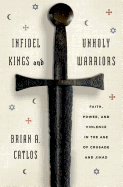
Popular conceptions about the role of religion in the Middle Ages take two basic forms. One version looks at the medieval world in terms of crusade, jihad and pogrom: a violent collision between mutually intolerant communities of Christianity, Islam and Judaism, with long-term consequences for the modern world. The alternate vision, popularized in works such as María Rosa Menocal's The Ornament of the World and focused on medieval Spain, is that of La Convivencia--a culture of mutual tolerance and reason. In Infidel Kings and Unholy Warriors, religious historian Brian A. Catlos (The Victors and the Vanquished) convincingly argues that neither interpretation adequately addresses the shifting political, economic and religious alliances of the Mediterranean world from 1050 to 1200.
Catlos looks at the complex relationship between politics and religious identity in the medieval Mediterranean through the stories of men who straddled communal boundaries in pursuit of power. Muslim and Christian kings made alliances against common enemies. Latin Christians went on crusade against other Christians. Sunni Muslims declared jihad against Shiites. Jews served as governors, generals and administrators in both Muslim and Christian kingdoms--and in one case came close to ruling a Muslim state. Mercenary warriors, including the legendary El Cid, switched sides whenever it was in their own interest.
Infidel Kings and Unholy Warriors is a fascinating and complex account of diversity, collaboration and conflict in the period when medieval Christianity met the Islamic golden age. --Pamela Toler, blogging at History in the Margins

